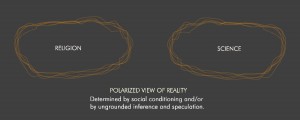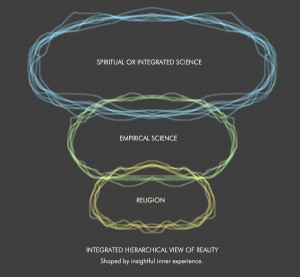“The words Religion and Spirituality are not interchangeable. They mean entirely different things. Religions are dependent on cultures and would in fact die out if humanity ceased to exist. They are a cultural & historic phenomenon and bound in relativity; dependent on belief or a following for their existence. Spirituality on the other hand is part of the matrix. Part of the physics of the subtle universe, and in fact all universes should they exist. Its existence is not dependent in any way on whether we believe in it or not. It exists as surely as the sun exists. Were all humanity to vanish Spirituality would remain unaffected for eternity.”
The conundrum posed by our existence is one that has challenged humanity’s best thinkers for millennia. Our conviction at having alighted on ‘the truth’ has provided us with endless hours of debate, inflamed our deepest passions and even divided whole nations and nations from nations, and it continues to do so. Imaginative stories handed down through generations and our wild speculations have determined the path humanity has carved through time, and millions have died defending a ‘truth’ that has later turned out to be false. Myths, it could be said, are merely our truths that have fallen from grace.
What is abundantly clear is that humanity is on a long and complex evolutionary journey. Not so much a physical one, (though that is also true) but a conceptual one that has brought us to a critical point in our understanding of the nature of existence. It does not take a genius to observe that humanity for all its technological development is ideologically unintegrated, and some would say hopelessly so. If we are beings with a Spiritual essence and are not just accretions of stardust then at some level we are united in our differences but on a psychological level our egocentric tendency to want to establish and reinforce our differences at any cost, rather than find that one idea that might unite us all, is tragic and tearing us apart.
Opinions now differ radically as to whether the cause of this human conflict is religious or due to the emergence of scientific reductionism or just down to plain old human nature. The one thing we can be certain about is that the divide is enormous and the gap not inclined to close any time soon unless there is a paradigm shift in our thinking. What is also certain is that conceptually there is no going back, though there are many who wish that we could. When religions compete with science as they have done for centuries now, science has the whip hand.
Humanity has invested a huge amount of time and energy in technological development and to understanding the nature of material reality but its understanding of a Subtle Nature beyond material existence is still entrenched and shockingly naïve. Questions posed by much respected academics within the scientific community as to the nature of consciousness, to pick one instance, presume it to be a material phenomenon when there is a significant body of knowledge in existence to suggest that it is not. If the questions we pose have already eliminated the sphere where the correct answer may be found then we will remain trapped in ignorance.
There is a rather tongue in cheek attitude aimed at those who spend their time considering where all This came from and how we got to exist at all. Observing me at thirteen sitting idly in a chair apparently doing nothing but gaze into space my mother would ask, “What are you doing?”
“Thinking!”
“What about?” she would challenge.
“Life,” I would say.
“Well you just sit there and think about life and I will get on with something useful.”
Contemplating how life works on a subtle level, meditation if you wish, is often seen as a rather indulgent and selfish activity that does not contribute much to the ebb and flow of society itself, but the paucity of our understanding on this level directly impacts on the choices we make and the future we forge. The rudder of our society may be awash with academic brilliance but it is short on the wisdom that emerges from this supposedly indulgent activity to the extent that the direction we steer is often completely counter to what would be best for the long term whole.
A very long time ago when the population of Earth was relatively small it did not matter too much what we thought about the mechanics of reality but now, as we stand on the brink of a global environmental crisis and perhaps even the perfect storm, it really does. We are all being asked to reflect on the nature of our desires. If we can no longer afford to want the material objects that have so charmed us for a century, then what? The ascendency of the philosophy of despair that has emerged out of Scientific Reductionism; ‘life has no meaning beyond what we see’; ‘Success can only be measured by how we dominate others who are weaker,’ runs counter to what most of us want to believe. Even if we do not understand, we cling to the notion that life has a subtler purpose or that things are meant to be. Well does it have a purpose and is there a principle that orders meant to be out of chaos? And that is not all.
There is another aspect to this discussion that has little to do with how history unfolds or how technologically advanced we become. How we conceptualise reality, the model we each hold in the very core of our being – or how we See – has a direct bearing on the nature of personal suffering. Though intrinsic to human nature, Suffering is a phenomenon of self awareness and is a mutable condition that we have the power to affect. This has always been the case and it transcends the ebb and flow of social change and development. Not for no reason is Samkhya Philosophy considered as, ‘that knowledge, knowing which, does away with all suffering.’
The implication is implicit in the statement. As a product of nature we are bound to the certainty of change and ultimately that process of change leads to our demise. Since we can do nothing about this inevitability it is not possible to eradicate physical, or emotional or intellectual suffering except through a modification of our perception.
At one time religions completely dominated the, ‘what is existence’ debate. Within Christianity, ideas that challenged the dogma of the period were met with violent opposition and repression. Heresy was once a crime punishable by death. The injustices that were carried out in the name of God are legion and very well documented so there is no necessity to dwell on them here. Even so, even in the near distant past, it was still extremely difficult for scientists as individuals to be objective and to disengage their ideas from the notion of the existence of God and when discoveries emerged to challenge the dogma of the day, even as recent as Darwinism, it often produced tremendous conflict both personal and social.
In defending notions held to be ‘The Word of God’ but that were clearly out of accord with the emerging empirical evidence of the day, as free thinkers prised open nature’s underbelly, the authority of the Christian church was gradually eroded until Christianity became a shadow of its former self and as such was unable to guide the rising star that was to become Reductionist Science that would then go on to become the platform for the now expanding Atheistic view of the status quo (those collective bodies that determine the policies that seek to shape our lives) that prevails today.
Religious fundamentalism may appear to be on the rise but I would risk stating that its days are numbered and not because atheism is going to sweep the planet. Creative imagination will always challenge ideological entrenchment and it was only a matter of time before our Creative Intelligence outwitted blind faith and the religious hysteria that is mistaken for spiritual experience. It is no longer an either/or choice of Religious Dogma or Scientific Rationalism. Dogmatic science masquerading as truth is no better than dogmatic religion masquerading as truth. The alternative view is one that sees the development of conceptualisation as hierarchical – first Religious Dogma, then Scientific Rationalism, then Integrated Science or as some would have it Noetic Science.
It is a model that proposes that matter is orchestrated by an Intelligent Principle that is not material in nature and which produces a symphony from inert matter that appears life filled or animated – a cosmic drama of such immense beauty and complexity that it inspires awe in every sense of the word.


